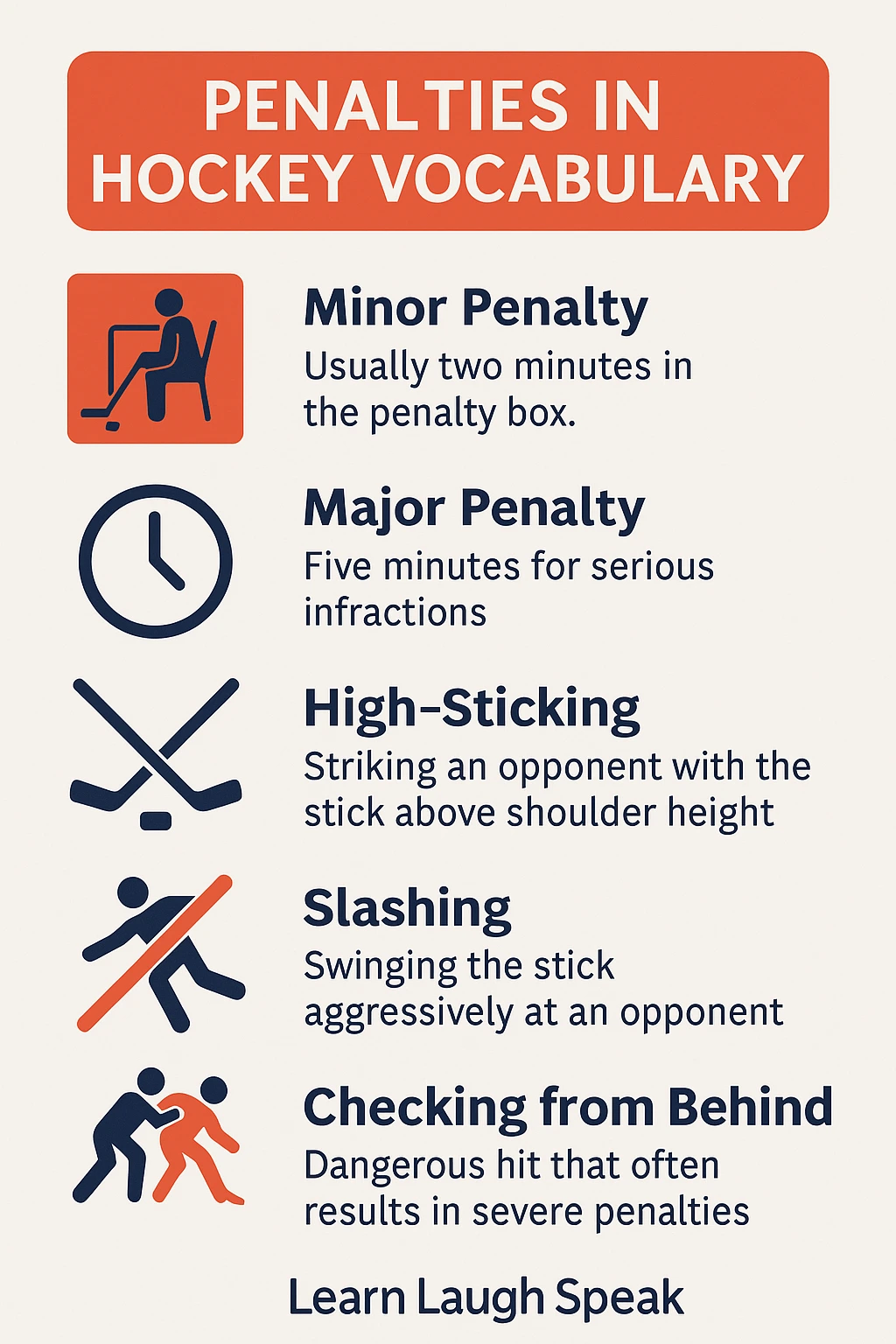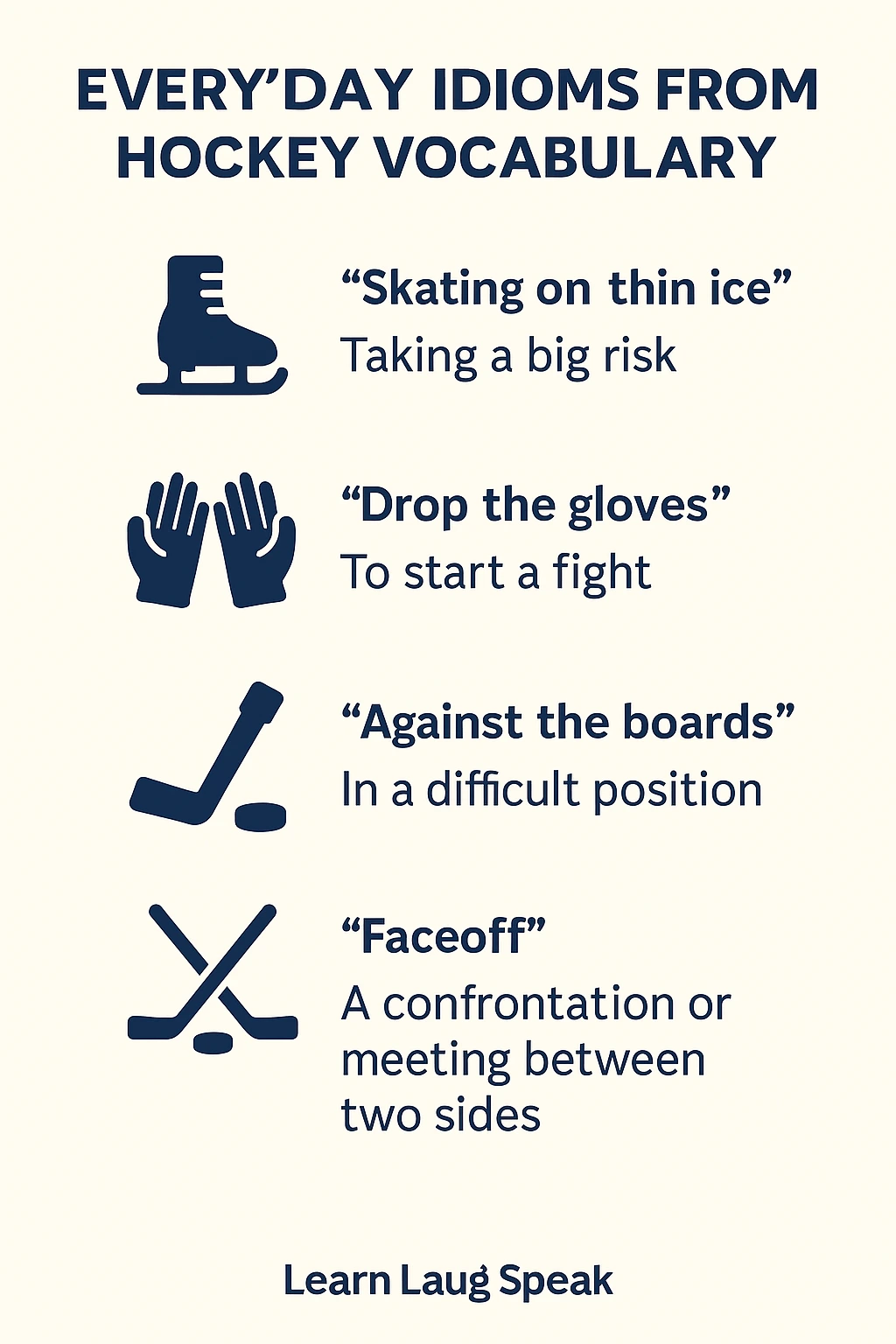Hockey is a sport of speed, precision, and passion. Played on ice in Canada, the USA, Russia, and Europe, it combines athleticism with strategy in every shift. For English learners, mastering Hockey Vocabulary is essential to follow the action, understand commentary, and even use expressions that spill over into everyday language.
35 hockey slang words, defined
Why Learn About the Vocab in the Sport
Hockey moves quickly, and so does its language. Without the right words, it’s difficult to keep up with the pace of the game or join discussions with fans.
Learning Hockey Vocabulary helps learners:
- Follow commentary during NHL or Olympic matches.
- Describe plays, penalties, and strategies with confidence.
- Recognize idioms in business and casual English that come from hockey.
From faceoffs to power plays, hockey’s language is as thrilling as the sport itself.

Core Terms in Hockey Vocabulary
To follow the flow of the game, start with the basic terms that appear in every match.
- Puck – The small, hard rubber disk players shoot.
- Stick – The curved tool used to control and hit the puck.
- Goal – When the puck crosses the line into the net.
- Faceoff – The method used to begin play or restart after a stoppage.
- Period – One of three segments of the game, each lasting 20 minutes.
These are the building blocks of Hockey Vocabulary.
Positions in Hockey Vocabulary
Each position has its own role, and knowing them helps learners understand the teamwork behind the game.
- Goaltender (Goalie) – Defends the net.
- Defensemen – Protect the defensive zone and block attacks.
- Wingers (Left/Right) – Forwards who attack along the sides.
- Center – Leads faceoffs and often directs play.
Every player contributes uniquely, and these terms anchor Hockey Vocabulary in strategy.
Scoring and Play in Hockey Vocabulary
Hockey is about more than just goals—it’s about how they are made.
- Assist – A pass that leads directly to a goal.
- Hat Trick – When a player scores three goals in one game.
- Breakaway – When a player gets free of defenders with only the goalie left to beat.
- Power Play – When one team has more players due to an opponent’s penalty.
- Penalty Kill – The defensive effort to survive while shorthanded.
These words in Hockey Vocabulary describe both glory and grit.
Penalties in Hockey Vocabulary
Discipline is central to hockey. Penalties are frequent and shape the flow of matches.
- Minor Penalty – Usually two minutes in the penalty box.
- Major Penalty – Five minutes for serious infractions.
- High-Sticking – Striking an opponent with the stick above shoulder height.
- Slashing – Swinging the stick aggressively at an opponent.
- Checking from Behind – Dangerous hit that often results in severe penalties.
Without knowing these terms, it’s easy to miss the tension in Hockey Vocabulary.
Tactics in Hockey Vocabulary
Strategy separates strong teams from champions. Common tactical terms include:
- Forecheck – Pressuring opponents in their defensive zone.
- Backcheck – Hustling back to stop an opponent’s rush.
- Dump and Chase – Shooting the puck into the opponent’s zone and pursuing it.
- Line Change – Swapping players during play to maintain energy.
- Penalty Shot – A one-on-one attempt after a foul stops a clear scoring chance.
These tactical expressions enrich Hockey Vocabulary and bring depth to analysis.

Everyday Idioms from Hockey Vocabulary
Hockey has left its mark on global English. Some phrases are used well outside the rink:
- “Skating on thin ice” – Taking a big risk.
- “Drop the gloves” – To start a fight.
- “Against the boards” – In a difficult position.
- “Faceoff” – A confrontation or meeting between two sides.
These idioms make Hockey Vocabulary useful in professional and casual contexts.
Rugby Vocabulary: The Language of Strength and Strategy
How to Practice Hockey Vocabulary
Improving your understanding of Hockey Vocabulary can be fun if you use the right methods:
- Watch NHL or Olympic highlights with English commentary.
- Read recaps from sports websites to see vocabulary in action.
- Practice with idioms like “skating on thin ice” in work or school settings.
- Engage in fan discussions online, especially in forums or comment sections.
Immersing yourself in the culture makes the words stick.
Baseball Vocabulary: Understanding America’s Pastime
Cultural Significance Sports and Vocabulary
In Canada, hockey is more than a sport—it’s a national identity. In Russia and Scandinavia, it inspires pride. Knowing Hockey Vocabulary also helps learners understand cultural celebrations like the Stanley Cup or Olympic rivalries.
The language reflects values of speed, toughness, and teamwork, traits admired in both sports and life.
Final Thoughts
Mastering Hockey Vocabulary connects learners to the energy of the fastest game on ice. From power plays to hat tricks, these words describe both thrilling moments and life lessons.
Whether you’re following the NHL, discussing resilience at work, or enjoying a local game, this vocabulary builds confidence and clarity.
When you learn Hockey Vocabulary, you gain fluency in both language and culture.
